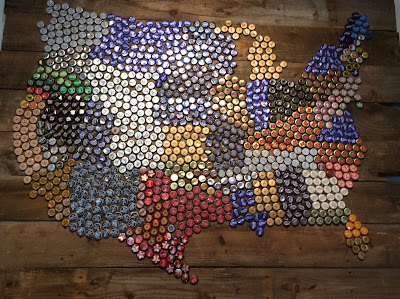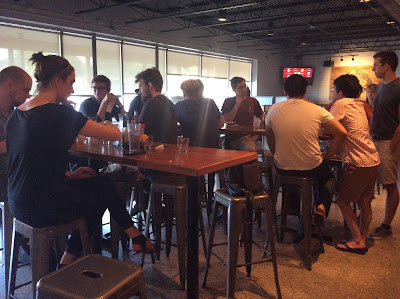 |
| I'm pretty sure this isn't to scale..... |
Kicking off the Saturday morning composer sessions was Dana Kaufman. Her presentation was based on the work she produced after receiving a research grant to study in Estonia. Talking about the culture, language was something Dana found to be both intriguing and frustrating - given the delicate political situations of the particular area of Europe (and something all too fresh in our minds given the current situations in Ukraine), Dana expressed the complexities of whether to use Estonian or Russian when talking to locals, which I found fascinating. Her first piece, "Solaris Kaskus" was based on a jingle for the grocery store in Tallinn that she would hear constantly whilst walking through the mall, but it was her second piece 'Peaporutus' (translates as 'Concussion') which I was drawn to. The piece was written in response to an physical assault Dana encountered whilst in Estonia, and she created a soundscape based on her experiences in the hospital, and the subsequent concussion she had. She stated that, "It's obvious that it's a piece rooted out of an angry experience", but she wanted to make sure that it was based on the truth of her surroundings, and did so by using the rhythm of the heart monitor machine she was hooked into, creating a pitch series using the numbers on her hospital bracelet, and interjecting a local folk melody and waiting room dialogue she heard around her. This is where music really connects, I feel, when it's rooted in truth. I really appreciated Dana's ability to take a dark experience and turn it into something wonderful, which is what music is really all about - take a listen:
https://soundcloud.com/dana-kaufman/peaporutus-concussion
Next up was Carter Rice, who trained at a conservative college (where, in his own words, Tchiakovsky was considered 'out there'), and didn't discover electronics in music until he was in his final years. He went on to Bowling Green State University (which appears to be a common theme amongst these guys) to get an Masters in electroacoustic music. His first presented piece, "Let me See your Face" was written for flute and electronics. He used a lot of collaboration for this particular piece, and Carter himself states that he thinks the flautist deserves as much credit as him as a composer due to the amount of input she had on the shape it took. He talked about how he developed the electronic elements, and expressed that he believes all electroacoustic music, whether it has a live electronics player or one solo performer playing many parts, requires a sound engineer in order for the piece to be successful. Carter is a pretty opinionated and characterful guy, and I have to admit, I don't wholly understand Carter's music, I think it's probably about as far away in style and technique to my own. He comes out with amazing phrases like, "pitch is boring to me", which is so wildly the opposite of what I think. But, even though I personally struggle to grasp his concepts, it's really easy to understand why he does what he does, because he is so passionate about it all (as evident by his very spirited presentation). I did, however, get more into his fixed media piece 'Launch Sequence' - I don't know whether that's because I could hear the concept more, or if I was just able to visualise something in my mind along with it, but I definitely found his use of stereo sound through the use of speakers really fascinating. You can hear Carter's music here:
http://carterricecomposer.weebly.com/listening.html
I've gotten to know Dan pretty well over the last week, with him being part of the #bantermobile and all, so I was really interested to finally hear some of his music after getting to know the person. Dan is currently studying at Boston Conservatory after graining his undergraduate in Miami, and chose to present his work as a sample of his development over the last 3 years. Dan has come to the festival straight away after attending another composer workshop in Vermont (New Music on the Point), and the first piece he presented was a piece written for, and premiered at that festival. A piece for vocalist and ensemble, Dan explained that he felt writing for voice to be his weakness, and something he plans to work on. For me, listening to the recording, although some of his vocal writing is a bit out there and complex, it was mainly the vocalist on the recording that I had trouble with, just from a stylistic point of view concerning vibrato. I suggested to him that he work with many different vocalists, with varying styles, ranges and vocal vibrato, as it'll help him understand singers better and create good vocal lines. Interestingly, he said he works with pitch first: he'll figure out the pitches he wants to use for his vocal lines and
then set the text, which is completely different to me - I almost always figure out the rhythmic capabilities of the text first, as really, singing is an extension of speaking - even when the pitches and music is complex or atonal, if it rhythmically works, the piece is more effective (and the singer likes you more as a composer!) - It was clear when Dan played his orchestral pieces that the he was more at home with writing for this medium, and I really enjoyed the colour he gets through in his music (as well as his fixation on 5's and 7's) - really worth checking out his stuff:
https://soundcloud.com/djkcmusic
The afternoons presentation was Loadbang ensemble: a quartet made up of Baritone Voice, Trumpet, Trombone and Bass Clarinet, playing both acoustic and electroacoustic music. These guys started their ensemble whilst together at college (except for the Bass Clarinetist, a role which they likened to the drummer in Spinal Tap, which amused me greatly), and subsequently had to create new music for themselves to perform as very little (if any) existed for their chosen ensemble formation. They talked about both the benefits of working in an ensemble like this (e.g. you can play and write whatever you want), and the hardships (finding scores, selling your music, bringing audiences to your music etc.). The main ideal of this group (as really should be the purpose of any group) is purpose. Everything should have a purpose in music, a reason why it's there, whether it's in the way you're writing something, or the instrumentation, or putting together a concert programme / set list. It's an ideal which I think many musicians forget about, and something to consider very carefully in the future. Another great concept that they put to us was having a proof reader for everything, and not just other musicians. If you've written a score that uses insane techniques, hand it to a musician who could potentially play it, and also someone who has no idea about the instrument or the techniques, and see if and how they understand your music. I'd say the same goes for popular musicians as well. If you've written a new song with your band, get feedback on it, from a fellow musician and someone who can't play anything - it will give you tremendous insight into if/how your music is coming across.
 |
| Social dinner with Loadbang |
- Loadbang, in general, had some great advice about how to manage yourself as a composer/musician: simple things like how you have to be a good book-keeper, and you have to be willing to cold-email people (and continue until you get a response, even if it is eventually no), and I really loved how willing these guys were to give me some direct advice when it comes to getting your music out to people. What's also great about this course in general is the ability to have a lunch or dinner with a certain group, so we're not only getting 'masterclasses' so to speak, but you get to discuss things with people in a more informal setting.
Getting away from the the music for a second, I have to mention all the really good food places here in Charlotte. I'm one of those people that, when in a foreign place, I want to try local places, and try to forgo fast food places as much as possible - however, Bojangles is an amazing fried chicken place (
way better than KFC) with a good convenient taste of the south (they don't say 'famous chicken and biscuits' for nothing!). Other food places I've been have been 'Nothing but Noodles', 'City Deli & Bagels', 'Crown Coffee Shop & Pub' (a combination which I think needs to be created
immediately back home), 'Panera Bread', 'Diamond Restaurant' and 'Chipotle' to name but a few. Making my way round the places this city has to offer (and avoiding McDonalds at all costs) - have yet to get me some good Southern BBQ though, I'm pretty sure that is next on the agenda!
 |
| Great Noise Ensemble |
Back to the music, the evenings concert was a selection of 'Program Favourites', as performed by the Great Noise Ensemble. Featuring the music of Marc Mellits, Armando Bayolo and David Lang, the general feel of the concert was certainly in the realms of minimalism. Of the composers, personally I connected best with Marc's music, and didn't really get David Langs. A piece which certainly had something about it was Armando's 'Elegy: Sandyhook', written for solo cello and electronics in response to the Sandyhook Elementary School shooting. Given the recent shooting incident (literally,
this week) just one state over, this piece definitely had a sense of poignancy and relevance. For me though, although I appreciate the solo ability of the cellist and the great effects and layering and timbre created with the laptop and pedals, I wonder if in a concert setting this would work as a cello octet, but still with electronics to create the effects like delay and distortion etc. Just, because of the subject matter, I felt I wanted to hear many individual voices rather than one voice over-layed. But who knows, maybe Armando does have a version of this for ensemble (....maybe I should ask him!) - it was still a really effective piece, none the less.
 |
| Nothing like a drinking game to chill out #4Kings |
- After the concert, you could tell, everyone was feeling the need to unwind in a massive way, so we retired to the common room of the QUC dorms to get some drinking in, along with some much needed laughter and games (and some card magic from Carter). And not just the composers: The Great Noise Ensemble Musicians joined us, as did course directors Elizabeth Kowalski and David Schneider for a hilarious round of 'Apples to Apples' (which is like a slightly more PC version of 'Cards Against Humanity', but still very, very funny). I keep saying it, but this really is a truly amazing group of people, and I've really enjoyed every minute of the workshop so far. We're half-way into the course now, and there is this lovely element of 'family' about the group - or as Dana put it, "This place is like a religious cult... but in a good way!" - I know what she means though, we really are in our own little CNMF bubble - but I'm really quite happy about it!




No comments:
Post a Comment